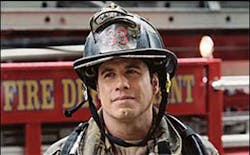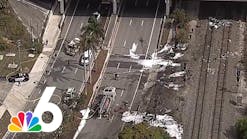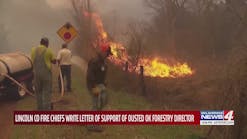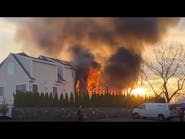I'm not sure firefighters could be any more admired and appreciated than they have been since Sept. 11. But should there be some stray soul who has remained unmoved by the courage required to walk through the doors of a firehouse, much less those of a burning building, "Ladder 49" should set him straight.
Is "Ladder 49," which has an injured firefighter trapped in a fearsome blaze recalling his too-brief career while awaiting a rescue, melodramatic? Yes, it is. Is it manipulative and predictable and over-romanticized? Oh yeah.
Is it an experience that touches us deeply and leaves us feeling grateful to strangers who do the dirtiest, hardest, most stressful work in the world because they believe they should? Yes, without doubt.
One of the few unarguably good things to result from that horrible day three years ago was that it forced us to revisit the real definition of the word hero. Though a script for "Ladder 49" had apparently been written before the attacks, director Jay Russell understands we will never watch another fire-fighting movie without thinking about it. He uses that fact without exploiting it, which is something of a trick in itself.
Set in Baltimore (a city that through TV shows like "Homicide" and "The Wire" has become what New York City long symbolized and Detroit tries to present itself as -- no place for sissies and no giving up, no matter what), "Ladder 49" sends Jack Morrison (Joaquin Phoenix) into an inferno in a 20-story office building and literally pulls the floor out from under him. With Jack trapped, Mike Kennedy, his onetime captain and now an assistant fire chief (John Travolta), soon shows up to personally head a rescue effort.
While Mike attempts to navigate the divide between his fatherly relationship with Jack and his responsibility to the men who will risk their lives to get him out, Jack has little to do but recall how he has spent his life. It begins with his initiation as a "probie" -- the nickname for probationary employees who by firehouse tradition are, and expect to be, hazed, humiliated and tested by the regulars. It leads to his realization that like most of those who survive it, he is cut out for the job.
"Ladder 49" then climbs the usual rungs, from Jack's first big fire to the tensions and camaraderie that are the unavoidable consequence of eating and sleeping for weeks at a time with the same group of people. Unwinding at a bar, he meets his wife-to-be, Linda (Jacinda Barrett, an appealing graduate of one of MTV's "Real World" peekaboos).
Whether you find these characters to be archetypes or stereotypes will have a lot to do with your tolerance for genre movies. But between a well-observed, if occasionally cliched, script by writer Lewis Colick (who also wrote Travolta's "Domestic Disturbance"), the good-guy charisma of Travolta and convincing supporting performances by Robert Patrick, Billy Burke, Jay Hernandez and Balthazar Getty as the guys, "Ladder 49" burns a lot more convincingly than Ron Howard's well-meaning but hackneyed "Backdraft." It also earns the tears Russell tugs at nakedly as Jack, in one of the film's best scenes, pulls an uncooperative length of hose.
For all its obviousness -- a bar celebration gets even rowdier when the Ohio Players "Fire" gets played -- "Ladder 49" has a cumulative impact; it's one of those films that can make a snob sentimental, especially if he knows a firefighter -- or a cop, or a nurse, or a prison guard -- who makes a difference. On one hand, you have fearless, wisecracking, invulnerable Bad Boys; on the other, you have grownups doing a risky job that has to be done.
Easy choice, and thanks.






